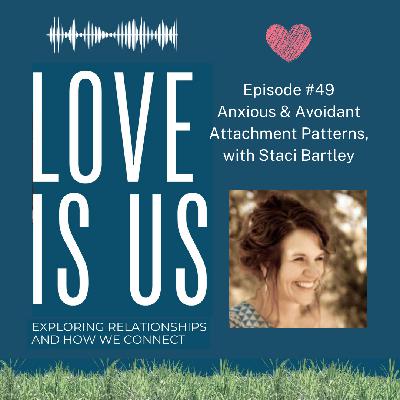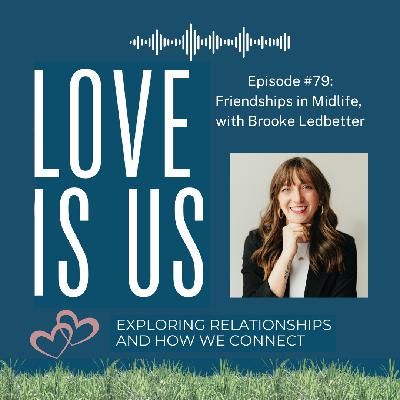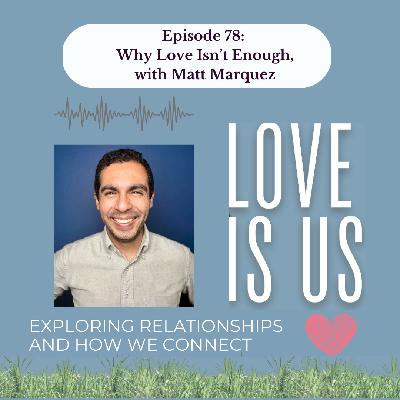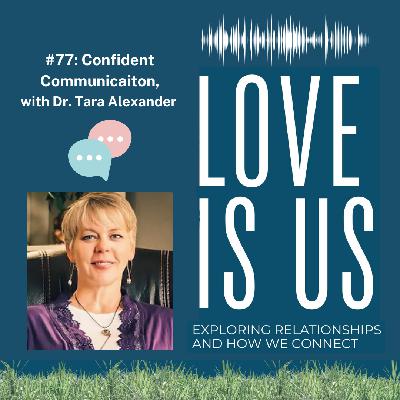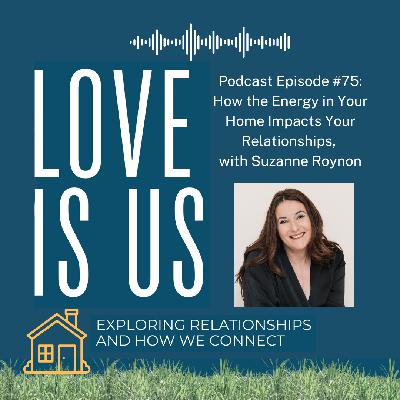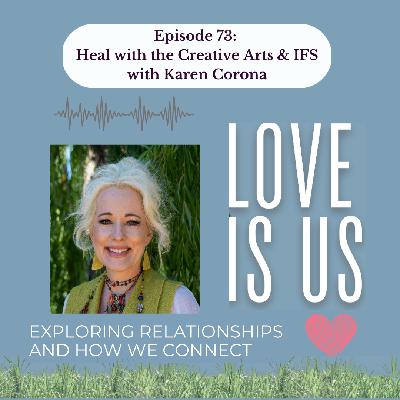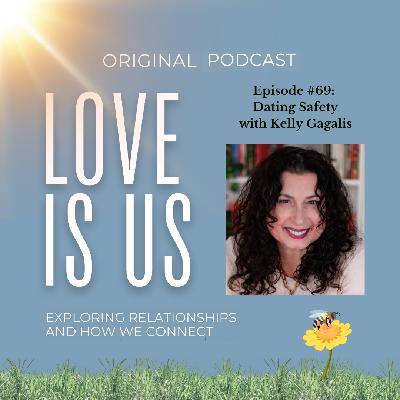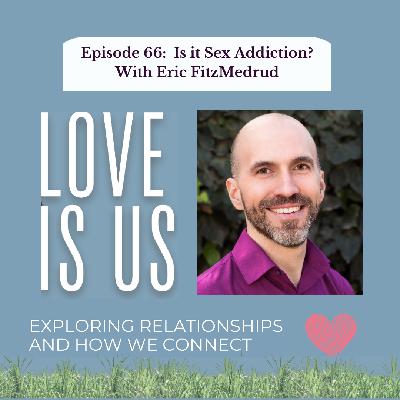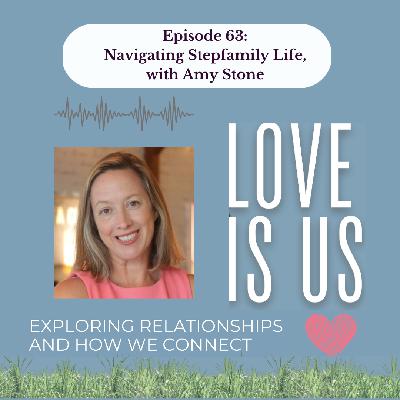#49 Common Anxious & Avoidant Attachment Patterns, with Staci Bartley
Description
Come join us for a conversation about anxious and avoidant attachment styles and why they so often end up together. We'll also talk about conflict and what love has to do with this work. You'll also hear both of us get choked up at the end of our conversation and hear how lucky we both feel to be working with people like you!
Staci Bartley is an integrative couples therapist. she's also a Certified Divorce Mediator, Certified Strategic Intervention Coach, graduate of energy and intuitive science, lifelong study of psychology, human sexuality, and universal principles. She is a speaker and workshop facilitator for medical and mental health professionals and has contributed to two wellness programs for fortune 500 companies. She is the Author of "Feeling Like Marriage is Dead? A Divorce Mediators Guide For Ensuring a Lifetime of Love." She is also the host of Love Shack Live along with her husband Tom. Love Shack Live is a live weekly radio show being broadcasted on KKNW 1150.
Learn more about Staci:
Website: www.stacibartley.com
IG: https://www.instagram.com/stacibartley/
Learn more about Karin:
Website: www.drcalde.com
IG: https://www.instagram.com/theloveandconnectioncoach/
TRANSCRIPT
Intro:
Karin: This is Love Is Us, Exploring Relationships and How We Connect. I'm your host, Karin Calde. I'll talk with people about how we can strengthen our relationships, explore who we are in those relationships, and experience a greater sense of love and connection with those around us, including ourselves. I have a PhD in clinical Psychology, practiced as a psychologist resident, and after diving into my own healing work, I went back to school and became a coach, helping individuals and couples with their relationships and personal growth. If you want to experience more love in your life and contribute to healing the disconnect so prevalent in our world today, you're in the right place. Welcome to Love Is Us.
Karin: Hello, everybody, and welcome to season two of Love is us. I'm so glad you're here and I have so many great guests lined up for this next season and I wanted to start off it off with a bang and I think I accomplished that. I am talking with Stacey Bartley today. She is a couple's therapist and she has been doing this work for a really long time and her depth of knowledge is impressive. But more than that, she's also just this really warm, loving person and I just could keep talking with her for hours, I think, so it was hard to keep it to an hour, but I think that this episode is just jampacked with great information. We talk specifically about that familiar pattern of these different attachment styles where one is more anxious and one is more avoidant and how that seems to be a common pairing. So we talk about why that is and what happens and what to do about it and also talk a lot about conflict. So I think you're going to enjoy this one. I really hope that you will share it with others and also leave me a review because that will help this podcast be seen by more people. So thanks again for being here. And here we go. Hello, Stacey.
[02:15 ] Staci: Hi, Karen. Good to see your beautiful face.
[02:18 ] Karin: And yours too. It's good to see you again. This is our second go round. We had had a really fun conversation a couple of months ago and our technology failed us. So lucky us, we get to spend some more time together.
[02:35 ] Staci: I know. I think it's really kind of a get to. There was no disappointment in that whatsoever. It was more of like, yes, wonderful.
[02:44 ] Karin: And I'm excited to talk with you. And so we decided just to kind of shift just a little bit, just because, yeah, we had that conversation and now I want to have a different one. So we're going to talk a bit about attachment today, but I wanted to start off with my standard questions and the first one is, where are you in the world?
[03:05 ] Staci: I am in Sacramento, California, in a little hilltown called Auburn. It's about 25 miles northeast of Sacramento, so it's beautiful. I have my private practice here as well, so we get a little bit. I'm from Utah, so I have this association with park city, if you're familiar with that. It's kind of like a little mini, quasi park city. It's very rich in food and music and art and culture and the little place where I live, I get to just walk everywhere. My office is about five minutes from where I live, so my husband and I share a car. I often say, gosh, we're kind of like college students. We have this one car that we share, but good. Really good. So that's where I'm at in the.
[03:55 ] Karin: I didn't. I knew you were in the Sacramento area, but I don't think I realized you were in Auburn. I've been through there. I haven't spent much time there.
[04:03 ] Staci: Yeah, we're about an hour and a half from Tahoe, from the sierras there, so we can go skiing, but we're also just shy of 2 hours to the coast. So we're kind of located in this little pocket where we can have access to many things. And then another hour and a half to Napa and wine country and Sonoma. And so there's some beautiful places in the world here, and that's why we stay. We love it so much there. So much here.
[04:30 ] Karin: Yeah. Wonderful. Well, tell us what you do for work.
[04:35 ] Staci: So I work with individuals and couples around relationships, conflict repair. Families often get brought into that. But that's the crux of my work. Through my studies and my journey, as we all have one, I realize that relationships are kind of at the heart of the human experience and that our mental, emotional, physical pain comes from relationship either with myself or others. And so I thought, that's where I want to double down. I want to go right to the heart of the matter. And so that's why I chose to do relationships. I could just see their impact on the human experience.
[05:14 ] Karin: I feel you. Absolutely. And I'm curious. I know you didn't start necessarily doing the work you're doing now, so how did you get there?
[05:27 ] Staci: Well, I'll try and shorten that. But started in my own journey in 1996, I was going through a divorce and questioning. It was that pivotal moment in my life where I was questioning the foundation which I had built my adult life on. And it was a divorce that had finally caused me to start reevaluating all kinds of things, my religion, adult life, the foundation and premise that I was building my life on. So I started my own journey of trying to put my hot mess back together. Studied hypnotherapy first. That's where I started in hypnotherapy. That just made the most sense. Right, let's just short circuit this and go right to the way the brain thinks and began there. And then when I stepped in and opened up a private practice of hypnotherapy, I had a lot of fear and insecurity around doing the work that I do. Come up and I went, oh, no, this isn't for me. I'm not doing this. I've not selected correctly here. And so I actually embarked on a journey of going into medicine and thought I was going to pursue that route and did some premed courses and started learning about the body and digestive health. And again, I wanted to go right to the heart. Like, what affects health in a human being? Digestion. Digestion is not working. Then everything else goes haywire. You can start to see a theme emerge there, right. For me, I'm always kind of looking at what affects what and what's the pivotal heart of it all. And what was interesting is, as I opened up a wellness center focusing on digestive health, I would always find myself in these relational conversations, and I was also able to start seeing how the emotional and the physical work in tandem, firsthand, in my experience, which was exceptionally fascinating to me. And then, of course, the realization that I've already shared with you, like, look, if you really want to support a human being, then go to the emotional side, because that's the part that's more challenging, number one. And number two, that's the catalyst for so many things, right? So that's when I doubled down and started much of my trauma work, my art therapy work, my divorce mediation work, was finally the cherry on top, because, quite honestly, I was very conflict avoidant myself. I did not like conflict. I was very uncomfortable in it. And I thought, man, if I'm going to get good at this, I've got to handle this for myself. So had a mentor teacher that brought me in and allowed me to work in her practice for three years, teaching me divorce mediation, allowing me to work side by side with her, and was able to overcome a lot of the conflict stuff that I myself was a little adverse to.
[08:12 ] Karin: Yeah, it is interesting how we do tend to be drawn to the work that also helps us, and if we can recognize that and do the work for ourselves, then we can be so much more effective, can't we?
[08:30 ] Staci: 100%. Well, I think that's the thing that's going to keep you in it. I love the saying, we teach what it is we need to learn. And the fastest way and eas

